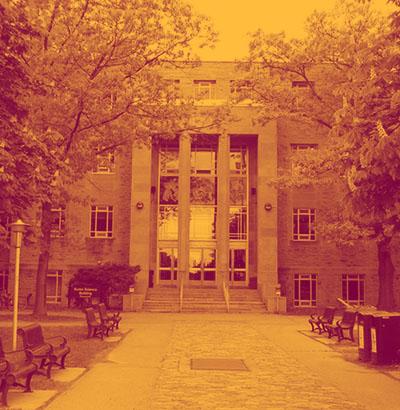Biology Honours Programs
Our most popular program because it offers students the most flexibility in course selection, the Honours Biology Core is built upon a set of fundamental courses that are shared with other Biology Honours specializations. You will be able to choose biology courses following your own interests, or develop an interdisciplinary approach to biology that makes it easy to obtain a minor in another subject, or prepare yourself for a professional program, such as midwifery or medicine. You can also select the level of exposure to the laboratory that you prefer. Students selecting this program should be aware that many 3rd and 4th year courses have specific course pre-requisite requirements.
The Honours Biology Research Specialization program allows students to choose Biology courses that reflect their own interests but includes more lab and research experience than the Honours Biology Core program. Biology Research Specialization students obtain practical training in experimental design by completing at least 9 units of laboratory and field biology courses and are required to complete a 6 unit senior project or a 12 unit senior thesis in level IV. Enrolment in this program is limited and possession of the published minimum requirements does not guarantee admission.
Physiology is concerned with how organisms function and it includes the study of processes such as nutrition, growth, reproduction, respiration, osmoregulation and excretion. This area also examines how animals sense and respond to conditions such as low oxygen availability or to environmental challenges such as pollution or global warming. Physiology involves study at all levels from molecules through cells, tissues, organs and whole animals.
Physiology is concerned with how organisms function and it includes the study of processes such as nutrition, growth, reproduction, respiration, osmoregulation and excretion. This area also examines how animals sense and respond to conditions such as low oxygen availability or to environmental challenges such as pollution or global warming. Physiology involves study at all levels from molecules through cells, tissues, organs and whole animals.
Students gain an in depth view of biological processes emphasizing the application of molecular biology and genetics in the study of human, animal and plant diseases, developmental biology, microbiology, gene regulation, evolutionary processes, and the growing field of bioinformatics. Students will obtain practical training in molecular biology laboratory skills and communication preparing them for graduate school, careers in medicine, genetic counseling, the biotechnology sector, bioengineering, pharmacology, agriculture and conservation.
Students gain an in depth view of biological processes emphasizing the application of molecular biology and genetics in the study of human, animal and plant diseases, developmental biology, microbiology, gene regulation, evolutionary processes, and the growing field of bioinformatics. Students will obtain practical training in molecular biology laboratory skills and communication preparing them for graduate school, careers in medicine, genetic counseling, the biotechnology sector, bioengineering, pharmacology, agriculture and conservation.
This program is aimed at students who want a challenging program that provides them with valuable experience obtained in an industrial research lab and in an academic research environment. For more information, please consult the Science Career & Co-Operative Education Office.
Honours BSc Neuroscience is geared towards undergraduate students who are interested in a career in neuroscience research. The program is jointly administered by the Departments of Biology and Psychology, Neuroscience & Behaviour (PNB). Neuroscience is an inherently interdisciplinary field. Comprising all research related to neurons and nervous systems, neuroscience spans a vast array of topics, from the biophysical and electrochemical properties of nerve cells to the developmental biology of neural circuit formation to the information processing calculations carried out by the brain. To be able to comprehend past and current developments in neuroscience, and to contribute to future developments, students obtain a broad foundational skill set in biology, chemistry, computer science, mathematics, and physics, coupled with a strong introduction to the core areas of molecular, cellular, and systems neuroscience.
Interdisciplinary Honours Programs
Honours Biodiversity and Environmental Sciences is a flexible program that enables students to obtain an understanding of how a variety of organisms are able to adapt to their changing environments at the community and ecosystem levels. Offered jointly by the Department of Biology and the School of Earth, Environment & Society, this program enables students to select courses according to their interests; to develop broad knowledge, and understanding of the linkages between biodiversity and environmental processes; and to apply these to questions of biological, biomedical, or environmental interests. This program prepares students for graduate studies, careers in industry or academic research laboratories.
Biomathematics, Computational Biology and Bioinformatics are disciplines that combine the use of Biology, Computer Science, Mathematics and Statistics to study questions of importance in Biology. These areas are as diverse as Biology itself. Many applications are in genomics and other high-throughout, data generating areas. Results from these areas are used in proteomics, pharmaceutical industry, biodiversity, conservation genetics, etc.
Honours Biology and Psychology, Neuroscience & Behaviour is designed for students with broad interests in the biological and neurosciences who want the freedom to choose the best courses from the Department of Biology and the Department of Psychology, Neuroscience & Behaviour (PNB). The program is uniquely interdisciplinary. Your studies can merge leading-edge knowledge from both fields, combining molecular biology, development, or ecology with the latest ideas in cognition, learning, or neurophysiology to gain a truly ‘big picture’ perspective of the living world. The fourth year research thesis can be taken under the supervision of either a Biology or PNB faculty member, so you will gain exciting hands-on experience in topics as diverse as clinical studies of child development, fieldwork in behavioural ecology, cellular neuroscience, or the molecular biology of social learning and memory. Because the program provides students with an elite double-major honours degree in Biology and PNB, it facilitates access to graduate schools in either discipline and to an array of clinical or professional programs (e.g., law, medicine, dental, clinical psychology), and it opens doors to careers in university or industrial research (e.g., pharmaceutics), genetic counselling, or education.
The Honours Integrated Science program is an interdisciplinary, research-based science program targeting highly motivated, high-achieving students. The science curriculum will be taught in a fully integrated way, and will allow students to understand how knowledge has accumulated within and across scientific disciplines, and how new scientific thought is created. Beginning in Level I, students will engage in research and will have opportunities throughout each level of the program to work with faculty members on interdisciplinary research projects in laboratory and field settings. Research collaborations and internships with government, industrial and community partners will also be encouraged. The Integrated Science program will intentionally teach scientific ‘literacy’ in its broadest sense and students will learn and develop skills in the areas of scientific writing, research ethics, and critical thinking.
For all counselling inquiries please include your name, program and student number in all correspondence.
| Counselling Inquiry | Contact | Title | Drop-in Hours |
|---|---|---|---|
| Biology Program and Curriculum Questions | Dr. Jon Stone | Associate Chair (Undergrad) | By appointment |
| General Biology Questions | Tyler Charlebois | Academic Program Assistant | Daily 9:00 am – 12:00 pm and 1:00 – 4:00 pm. (LSB-218) |
| Thesis & Independent Research/Experiential Courses | Dr. Patricia Chow-Fraser | Coordinator | By appointment |
| Field Biology Program | TBD | Coordinator | By appointment |
Undergraduate Life

WEBSITE
Admission Requirements

LINK
Course Outlines

WEBSITE
McMaster Academic Planner

LINK
